|
November 10, 2016
Restructuring of U.S. Steel
Moving Stelco Pensions Off
the Balance Sheet
PDF
Restructuring of U.S. Steel
• Moving Stelco Pensions Off the Balance Sheet
• Imperialist Democracy In Action -
Rolf Gerstenberger
Quebec Government
Passes Bill 110 to Restructure Labour Relations in the Municipal Sector
• Couillard Coup Against Workers' Rights
• Liberal Government's Anti-Worker Bill
• Quebec Municipalities Criticize Bill 110
• Clash of Rights, Clash of Democracies -
Pierre
Chénier
Quebec Health Care
Workers Oppose the Anti-Social Offensive
• Paramedics Demand Working Conditions
Commensurate With the Work
They Do -
Interview, Jean Gagnon, Confederation of National Trade
Unions
Restructuring of U.S. Steel
Moving Stelco Pensions Off the Balance Sheet
The Bedrock proposal to seize control of the former
Stelco steel
producing properties is centred on moving the pension plans off the
balance sheet. Why is the financial oligarchy obsessed with this
demand? Apparently, without moving the pensions off the balance sheet
Bedrock will not buy Stelco's productive assets. This is reminiscent of
the scheme of the financial oligarchs who engineered a big score to
bring Stelco out of Companies' Creditors Arrangement Act
(CCAA) bankruptcy protection in 2006. The success of that scam
hinged greatly on the Ontario government violating its own pension laws
by allowing the pension plans to go underfunded for a further ten
years. The hooliganism of the provincial government did not stop there.
It handed
over $150
million to the plotters and said with tongue in cheek that if the
pensions were not fully funded by the end of 2015 then they would
have
to pay the loan back! If they did make the pension plan whole, they
could keep $100 million and only pay back $50 million! Thank you very
much, laughed the oligarchs, and
the next year they ran off with $1.2 billion to fatten
their pockets when they flipped Stelco to U.S. Steel. The new ruling
oligarchs from Pittsburgh and New York then said, we are not making the
pension plans whole and we are not paying back the provincial loan. We
are demanding $126 million for our troubles in trying to destroy
Stelco, and a CCAA judge has agreed. So there you are and
you can stuff it!
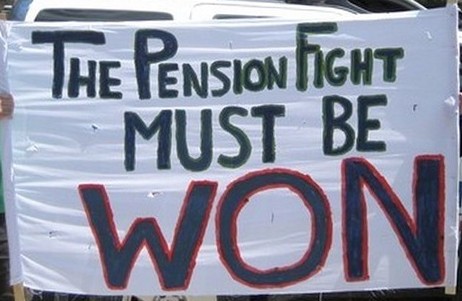 The Stelco company
defined-benefit pensions are linked to the new
value steelworkers produce. Defined-benefit pension plans need newly
produced value to meet the defined claims of retirees. The past value
Stelco steelworkers produced is contained in the assets of the pension
plans and in the productive mills in Hamilton and Nanticoke.
New value going into the plans is comprised of claims on new value
current Stelco steelworkers produce plus investment income from the
plans, which comes from new value other workers produce. To sustain the
defined benefits of Stelco retirees, the pension plans require the
accumulated assets in the plans, income from investments of those
assets, and an ongoing claim on the new value Stelco steelworkers
produce. When sufficient new value is not regularly claimed from
realized Stelco production or the invested assets, then the plans fall
below a threshold where they can meet the defined benefits of retirees,
when and if the company goes out of business and no new produced value
is available. The Stelco company
defined-benefit pensions are linked to the new
value steelworkers produce. Defined-benefit pension plans need newly
produced value to meet the defined claims of retirees. The past value
Stelco steelworkers produced is contained in the assets of the pension
plans and in the productive mills in Hamilton and Nanticoke.
New value going into the plans is comprised of claims on new value
current Stelco steelworkers produce plus investment income from the
plans, which comes from new value other workers produce. To sustain the
defined benefits of Stelco retirees, the pension plans require the
accumulated assets in the plans, income from investments of those
assets, and an ongoing claim on the new value Stelco steelworkers
produce. When sufficient new value is not regularly claimed from
realized Stelco production or the invested assets, then the plans fall
below a threshold where they can meet the defined benefits of retirees,
when and if the company goes out of business and no new produced value
is available.
Because of less than necessary claims on new value
since the 1990s,
when the Ontario government decided to break its own pension laws
for companies deemed "too big to fail," the Stelco plans are now
over $800 million underfunded. Bedrock and other oligarchs who
want the
productive capacity of Stelco steelworkers and
their steel mills refuse to allow retirees their right to continue to
claim new Stelco value for their defined benefits even though that was
the solemn agreement the owners of the steel mills made to workers in
exchange for their capacity to work during their working lives prior to
retirement.
Moving the pension plans off the balance sheet is
similar to
winding them up except in this case the oligarchs refuse to make the
plans whole and capable of meeting the defined benefits of all members
until they pass away, which would require around $800 million.
Instead,
they are offering a pie in the sky scheme of polluted land,
which requires extensive and expensive investments for environmental
remediation. In other words, instead of making the pension plans whole
in winding them up, they are wiping their hands clean of a huge
environmental problem and the pensions. What a scam!
 The imperialist rich appear
unwilling to uphold any agreement and
workers have to fight on every issue. Bedrock and the provincial
government are offering the lands beyond the mills as a ruse to have
workers agree to take the pensions off the balance sheet, which in
essence means winding them up without making them whole. The imperialist rich appear
unwilling to uphold any agreement and
workers have to fight on every issue. Bedrock and the provincial
government are offering the lands beyond the mills as a ruse to have
workers agree to take the pensions off the balance sheet, which in
essence means winding them up without making them whole.
The Stelco lands in Hamilton are the most valuable as
they could function as a new port but a big problem stands in the way.
They have been subjected to industrial pollution for over a century
without much, if any, effort for environmental remediation. An enormous
investment
would be needed prior to the land being able to function
productively or in any capacity. The land requires remediation but the
official announcement of the Bedrock proposal says the present
responsible party U.S. Steel is to be released "of all claims against
U.S. Steel regarding environmental, pension and other liabilities."
Bedrock will be released from responsibility for the pensions and
environment
cleanup as well by taking them off the balance sheet and turning over
the polluted lands to a trust administered by the province. After a few
years of grace, Bedrock will then flip Stelco for a big score, thank
you very much.
Knowing only the broad strokes of the Bedrock proposal,
because the
details are "top secret" and presumably to be found only in a Hillary
Clinton email that
Wikileaks has yet to release, the plan to remove the pensions from the
balance sheet is a non-starter. That proposal alone is worse than the
last scam coming out of CCAA in 2006 giving the oligarchs
a $150 million provincial loan and a non-consequential penalty for
refusing to make the pension plans whole by the end of 2015.
 The Bedrock proposal is a
bad joke. The political representatives
of the oligarchs in the provincial and federal governments should be
ashamed of themselves for kowtowing to these U.S. imperialists by not
holding U.S. Steel to account for its pension and environmental
obligations, its broken promises on production and employment, and its
wrecking of Stelco production capacity and absconding with its order
book. Instead, the Canadian state authorities, including the courts,
are allowing U.S. Steel to run back to the U.S. with a payoff
of $126
million while offering up workers and pensioners as sacrificial lambs
so that the Bedrock oligarchs can make a big score. It must not
pass! The Bedrock proposal is a
bad joke. The political representatives
of the oligarchs in the provincial and federal governments should be
ashamed of themselves for kowtowing to these U.S. imperialists by not
holding U.S. Steel to account for its pension and environmental
obligations, its broken promises on production and employment, and its
wrecking of Stelco production capacity and absconding with its order
book. Instead, the Canadian state authorities, including the courts,
are allowing U.S. Steel to run back to the U.S. with a payoff
of $126
million while offering up workers and pensioners as sacrificial lambs
so that the Bedrock oligarchs can make a big score. It must not
pass!
A pro-social alternative is possible to bring Stelco
back to
complete productive life capable of meeting all its economic and social
responsibilities. It just requires some backbone to stand up to these
oligarchs.

Imperialist Democracy In Action
- Rolf Gerstenberger -
 Imperialist democracy in
action. Those who are most affected by
decisions have no idea what is going on, are not allowed to know what
is being prepared, have no input and no control over the process or
what is decided. The steelworkers, salaried employees, all the
pensioners and even Canadians concerned about their economy and society
are left in the dark until everything has been finalized and then they
can carp and criticize and protest and shout and scream but the big
lines have been drawn and no turning back or alternate direction is
possible or allowed. Imperialist democracy in
action. Those who are most affected by
decisions have no idea what is going on, are not allowed to know what
is being prepared, have no input and no control over the process or
what is decided. The steelworkers, salaried employees, all the
pensioners and even Canadians concerned about their economy and society
are left in the dark until everything has been finalized and then they
can carp and criticize and protest and shout and scream but the big
lines have been drawn and no turning back or alternate direction is
possible or allowed.
The liberal conciliators with imperialist democracy
make it all
happen by blocking the development of independent voices and
institutions of the working class so that the class is left with few
options as workers and their few genuine leaders are bombarded with
calls that they should be pragmatic and go for what is possible within
the
situation.
Nothing is going to be sorted out. The self-serving
fraud is a
foregone conclusion and once the theft can no longer be concealed, then
those who participated in bringing it about will say -- Whatever
happened before noon today is the past. Let bygones be bygones.

Quebec Government Passes Bill 110 to
Restructure
Labour Relations in the Municipal Sector
Couillard Coup Against Workers' Rights

Municipal workers demonstrate against Bill 110 at press conference of
Montreal Transit
Corporation to mark 50th anniversary of Montreal
Metro, on October 17
The Philippe Couillard Liberal government of Quebec
passed Bill 110, An Act respecting the process of negotiation
of collective agreements and the settlement of disputes in the
municipal sector
on November 2. It was passed in spite of the vigorous opposition
of
municipal workers, those who do the work and deliver
the services. Municipal workers' unions with active organized support
from their members throughout Quebec denounced Bill 110 as an
attack on
the right of workers to negotiate their working conditions. In view of
the bill's passage, the unions have announced a legal challenge to
declare the legislation unconstitutional.
The government passed the bill despite widespread
opposition from
many municipalities and mayors. Several city councils voted unanimously
that they consider the legislation an attack on the basic right of
municipal workers to negotiate their working conditions and an attack
on the municipalities themselves. Some have expressed their
jurisdictions' unwillingness to implement the bill.
The Minister of Municipal Affairs, to whom
Bill 110 gives full
power over the labour relations in the municipal sector, would not
listen to anybody opposing the bill and rammed the legislation through
to achieve a Cabinet coup over relations with municipal workers. This
serves the private takeover of public services within the
framework of the neo-liberal free trade agreements and their
supranational decision making. The passage of Bill 110 took place
just
days after Prime Minister Trudeau flew to Brussels to sign the CETA
free trade agreement with the European Union on behalf of the
oligopolies, which have privatization and seizure of municipal services
as an
important target.
Quebec workers cannot but draw the warranted conclusion
that
together with the workers of the rest of Canada they must step up their
fight against those who are violating their rights and the rights of
all and selling out society's assets. The Couillard coup against the
right of municipal workers to bargain in an organized collective way
their
wages, benefits, pensions and working conditions with their employers
proves the Liberal government is unfit to govern.

Liberal Government's Anti-Worker Bill
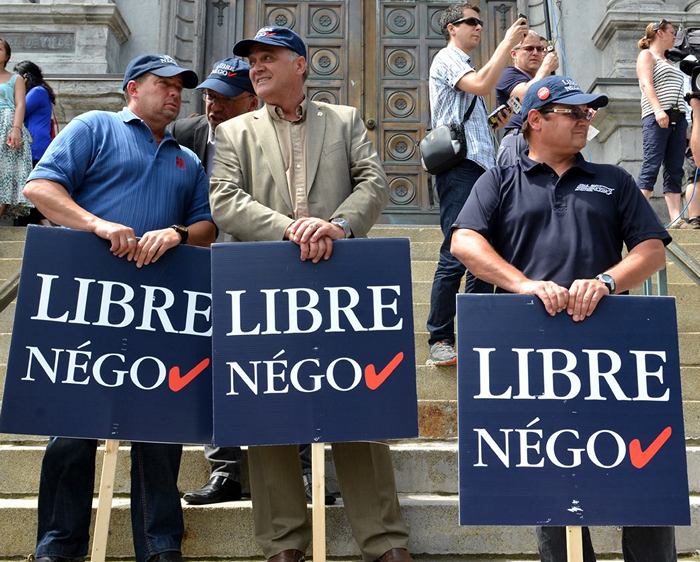 Bill 110 of the
Couillard Liberal government of Quebec enshrines
the use of special legislation to decree working conditions in the
labour relations regime of the municipal sector throughout Quebec. It
sets up a mechanism under the control of the Minister of Municipal
Affairs that leads directly to application of a special law. At each
step, the Minister is empowered to intervene in negotiations between
municipal workers and their employers, first by forcing the parties
into mediation. The legislation establishes bodies appointed by the
Minister and directly answerable to the Minister. They have the power
to declare that negotiations are not proceeding according to the wishes
of
the government thereby unleashing a special law to decree working
conditions unilaterally. These bodies are required by the legislation
to make decisions on contracted working conditions based on preset
municipal and provincial budgets. They are prohibited from considering
the views of municipal workers and their unions regarding their needs
for wages, benefits and pensions at a Canadian standard and the working
conditions they require to provide municipal services at standards the
people demand and expect.[1] Bill 110 of the
Couillard Liberal government of Quebec enshrines
the use of special legislation to decree working conditions in the
labour relations regime of the municipal sector throughout Quebec. It
sets up a mechanism under the control of the Minister of Municipal
Affairs that leads directly to application of a special law. At each
step, the Minister is empowered to intervene in negotiations between
municipal workers and their employers, first by forcing the parties
into mediation. The legislation establishes bodies appointed by the
Minister and directly answerable to the Minister. They have the power
to declare that negotiations are not proceeding according to the wishes
of
the government thereby unleashing a special law to decree working
conditions unilaterally. These bodies are required by the legislation
to make decisions on contracted working conditions based on preset
municipal and provincial budgets. They are prohibited from considering
the views of municipal workers and their unions regarding their needs
for wages, benefits and pensions at a Canadian standard and the working
conditions they require to provide municipal services at standards the
people demand and expect.[1]
Passage of the bill means that negotiations in the
municipal sector
will take place in a context of maximum pressure on municipal workers
and their unions to accept whatever the employer puts on the table.
This is particularly true in Montreal and Quebec City, whose
authorities have been in the forefront of demanding the powers
contained in
the bill. The pressure to accept imposed working conditions under the
threat of imposition of a legislative decree comes with criminalization
of those workers and unions that refuse. This direct dictatorship and
denial of workers to bargain the terms of the sale of their capacity to
work is unacceptable in modern Quebec and Canada and will lead to
constant disequilibrium in relations of production.
Note
1. For more information on Bill 110, see Workers' Forum,
September 8, 2016

Quebec Municipalities Criticize Bill 110
The Quebec Liberal government refused and still refuses
to
recognize the legitimate stand of the growing numbers of municipalities
against Bill 110 and the unanimous opposition of
workers
who demanded that the bill be withdrawn. The government simply
dismissed the position of the municipalities and declared that
the law will force them to abandon negotiations with their workers as
the law will apply to all of them equally.
The Couillard Liberals were so keen to use their
political power to
defend the bill against the actions of those municipalities that do not
want to attack the right of their workers to negotiate their working
conditions, the Minister responsible made an amendment to
Article 5 of
the bill, which originally read as follows:
"On receiving the notice provided for in section 4
[the notice from
the employers that says that negotiations failed to produce a tentative
agreement within the time limit set by the law -- Ed note] the
Minister
responsible for the administration of the Labour Code must appoint a
mediator to help the parties settle their dispute."
The Minister added the following paragraph: "The
Minister may act
on its own if it has received no notice on the fifteenth day following
the expiry of any time limit under this article, whichever is
applicable."
This amendment is a direct rebuff of those
municipalities and
unions that want to continue to negotiate without the Minister imposing
a mediator because they know that the imposition of a mediator leads
straight to the special law dictating working conditions.
Municipalities that oppose the legislation range from
mid-sized,
such as Sorel-Tracy in Montérégie, to small
municipalities such as
Grande-Rivière in Gaspésie with a population of just
over 3,500 people.
In October the City Councils of both municipalities voted unanimously
against the bill. The Mayors of Rouyn-Noranda and
Ville-Marie in the Abitibi-Témiscamingue region have also
denounced it.
The resolution of the Sorel-Tracy City Council reads:
"Be It Resolved
"THAT the Council informs the Minister of Municipal
Affairs and
Land Occupancy that it is of the opinion that the National Assembly's
adoption of Bill 110 would compromise people's basic right to
negotiate
and create a labour relations imbalance between the parties with
potentially negative repercussions on the work climate and
labour relations in the municipal sector,
"THAT Council demands that the Government of Quebec
give full
autonomy to municipalities to set the working conditions of their
employees,
"THAT Council informs the Quebec government that it
will not use
the mechanisms that are prescribed by such a law, if adopted as drafted,
"THAT Council demands the Quebec government amend
Bill 110 in order
to give municipalities the power to avoid the application of the latter
and thus voluntarily negotiate with the trade unions representing its
employees."
To stem criticism of the bill, the Minister included
amendments to
add "flexibility." These amendments do nothing to address the central
issue that workers must have a say and control over their working
conditions, wages, benefits and pensions. He pushed through an
amendment to Article 4 which extends the negotiation period
from 120 to 240 days before the Minister will impose
mediation with a
mediator he appoints. This change means very little, as any
municipality that does not want to negotiate can simple wait out
the 240 days. As well, negotiations will now begin 90 days
before the
date of expiry of the collective agreement and not the
day of expiry as before.
In spite of the mounting opposition, the Couillard
government marched straight ahead with this coup that allows it to take
over negotiations in the municipal sector. This serves the anti-social
agenda of certain municipal governments such as those of Montreal and
Quebec with their projects to privatize municipal services. The
Couillard Liberal
government and
like-minded neo-liberals in some cities are in step with the Trudeau
Liberal government's mania for free trade treaties under the control of
the global oligopolies seeking to seize and exploit public services and
infrastructure. CETA, the free trade agreement between Canada and the
European Union, is one of those treaties. Among other things,
CETA considers public services as markets and guarantees access to
these "markets." It provides that global oligopolies can sue
governments for impeding "access" to public services. To fulfill their
anti-social aim to control and exploit municipal workers and the
services they provide, the oligopolies need to break the workers'
resistance and
defence of their rights and the people's front in defence of their
public services and society. Let all working people, youth and seniors
stand with municipal workers in opposition to the Couillard
government's coup against municipal workers. This coup against workers'
rights will not stand!

Clash of Rights, Clash of Democracies
- Pierre Chénier -
Quebec Minister of Municipal Affairs Martin Coiteux
made it
clear during the lead up to the passage of anti-worker Bill 110
that
the government was not going to allow discussion on the actual wages
and working conditions of municipal workers or the history of labour
negotiations in the municipal sector. According to the
self-serving view of the government, negotiations generally have tipped
in favour of the workers and are jeopardizing the finances of the
cities. This necessitates stern action and trampling on the rights of
municipal workers, according to the Minister, and that was the end of
it.
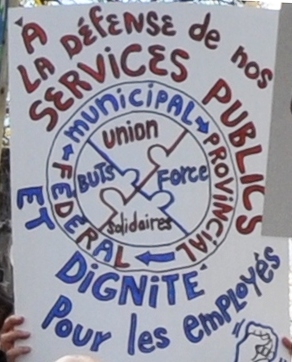 The Minister made it clear
that he was not interested in the facts,
in clarifying issues or in reaching any equilibrium with the working
class. He just kept repeating, as if it were a profound magic formula,
his mental construct that a municipality is a "democratic institution"
accountable to taxpayers. That reality pounding his brain justifies
depriving workers of their rights. Consequently, he said, the
government needs legislation to balance the expectations of union
members with the sound management of the finances of this "democratic
institution." To achieve his conception of balance, his government has
unleashed a torrent of hatred and punitive actions against municipal
workers.
The Liberals' balance in favour of the financial oligarchy is to be
achieved at the expense of the rights of workers and any hope of
equilibrium in relations between employees and employers. The Minister made it clear
that he was not interested in the facts,
in clarifying issues or in reaching any equilibrium with the working
class. He just kept repeating, as if it were a profound magic formula,
his mental construct that a municipality is a "democratic institution"
accountable to taxpayers. That reality pounding his brain justifies
depriving workers of their rights. Consequently, he said, the
government needs legislation to balance the expectations of union
members with the sound management of the finances of this "democratic
institution." To achieve his conception of balance, his government has
unleashed a torrent of hatred and punitive actions against municipal
workers.
The Liberals' balance in favour of the financial oligarchy is to be
achieved at the expense of the rights of workers and any hope of
equilibrium in relations between employees and employers.
Minister Coiteux turned the expression "democratic
institution"
into simple-minded public relations disinformation to justify the
denial of the
rights of working people, which cannot be justified in the modern
world. Municipal governments in the larger cities are under the control
of the financial oligarchy. They have very specific neo-liberal agendas
to
privatize services, outsource jobs, drive down wages and pensions, and
raise taxes and user fees. This anti-social agenda serves the private
interests of those who own and control great social wealth, the
oligopolies of the financial oligarchy. The governments of the big
cities and Quebec and
federal governments have more or less fallen under the supranational
control
of global oligopolies and systematically attack the interests of
working people.
Those governments are democratic institutions of an old
type to
serve the financial oligarchy, those who own and control great social
wealth. They function to block the empowerment of working people and
deprive them of their rights. They are not democratic institutions of a
renewed type to empower the working people to take control of
their work and lives and forge a new pro-social direction for the
economy and society.
Minister Coiteux in serving the narrow private
interests of the
financial oligarchy promotes imperialist democracy to justify
attacking the rights of municipal workers and an increase in their
exploitation and seizure of the value they produce. The oligopolies
want to deprive municipal workers of their line of defence of their
rights and the
public services they provide. They want to deprive municipal workers of
a say over their working conditions, which are the conditions of the
delivery of public services. Governments want to bring municipal
services more firmly under the direct control of the global oligopolies
to serve their narrow private interests.
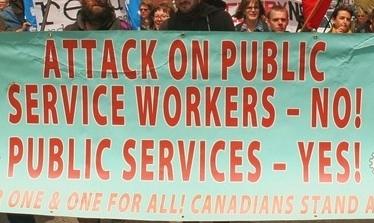 Municipal workers fighting
in defence of their rights and the
public services they provide are a first line of defence against the
oligopolies and their imperialist democratic institutions and their
anti-social supranational agenda. They are fighting to deprive the
imperialist democratic institutions of their power to deprive workers
of their rights.
Municipal workers are best placed to participate in exercising
pro-social control over the direction of the municipalities where they
work, including their working conditions and the delivery of services
but the imperialist democratic institutions of the financial oligarchy
are blocking such a positive development. The clash of rights of the
workers
with those of the oligopolies is also a clash of democracies: renewed
democracy to empower the working people versus entrenched imperialist
democracy of the oligopolies. Municipal workers fighting
in defence of their rights and the
public services they provide are a first line of defence against the
oligopolies and their imperialist democratic institutions and their
anti-social supranational agenda. They are fighting to deprive the
imperialist democratic institutions of their power to deprive workers
of their rights.
Municipal workers are best placed to participate in exercising
pro-social control over the direction of the municipalities where they
work, including their working conditions and the delivery of services
but the imperialist democratic institutions of the financial oligarchy
are blocking such a positive development. The clash of rights of the
workers
with those of the oligopolies is also a clash of democracies: renewed
democracy to empower the working people versus entrenched imperialist
democracy of the oligopolies.
Any authority or institution, public or private that
attacks the
rights of the working people reveals that it is an imperialist
instrument to deprive working people of their right to a say and
control over those affairs that affect them. Any authority or
institution that empowers the working people to take control of their
work and lives can play a
positive role in the renewal of democracy and forge a new pro-social
direction for the economy and society.

Quebec Health Care Workers Oppose the
Anti-Social Offensive
Paramedics Demand Working Conditions Commensurate With
the Work they Do
- Interview, Jean Gagnon, Representative
of
Pre-Hospital Sector of Health and Social Services' Federation,
Confederation of National Trade Unions (CSN) -

Paramedics and other health care workers demonstrate in Quebec City
October 27, 2016.
The paramedics, dispatchers
and support workers of the pre-hospital
sector are stepping up their fight to improve their working conditions
which determine the quality of care that they provide. The workers of
this sector, who are organized in the Health and Social Services
Federation of CSN, are seeking strike mandates from their members
across Quebec. Workers in the pre-hospital sector of Quebec who are
affiliated with the Quebec Federation of Labour are also stepping up
their mobilization to defend their dignity as workers and the services
they provide.
Collective agreements in the sector expired on
March 31, 2015. Workers condemn the refusal of the Quebec
government to meet with them to negotiate agreements that recognize the
important work they do, in very difficult conditions, for the people of
Quebec.
Posted below is an interview with Jean Gagnon, the
representative of the Pre-Hospital Sector of Health and Social
Services' Federation of the Confederation of National Trade Unions
(CSN).
***
Workers' Forum: What are the main
demands of the workers of the pre-hospital sector at this time?
Jean Gagnon: There are two
major issues, besides
our demands for improved wages and pension fund. One is workload. In
the big urban centres such as Montreal and Laval, the main issue is
that the workload has become very heavy. Already, because of the nature
of
the work we are doing, there is a lot of stress
at work, and it is well documented that in our sector we do not work as
many years as workers in other sectors. The workload is so heavy that
paramedics are exhausted while on the road providing the service.
The other major issue, which concerns the workers in
small centres and especially in remote regions, is on-call schedules,
which we call 7/14, This means that workers are on duty seven days in a
row, on call 24 hours a day, and then have seven days off. These
on-call schedules were introduced in the past to save costs, because in
some locations there were only a few calls to answer so workers were
put on that kind of schedule. But now those are completely outdated.
With a workload that has become so heavy, there are
places where our workers do more than 16 hours on the road. That is not
acceptable. And as far as the services to the people are concerned, it
is not acceptable in 2016 that people have to wake up and get dressed
to get into the ambulance and answer a call. That is why we are
demanding that workers who work in the regions are put on hourly work
schedules.
The workload has increased a lot because, first of all,
over the
years the volume of calls has increased a lot. The time it takes to
answer a call is higher because now we have more things to do. The
service we provide is more complex. We stabilize the patients before we
go. We have to assess them and this takes time. Meanwhile, the number
of vehicles and the staffing levels have not kept pace with this
increase of the volume of calls. It is not uncommon that in Montreal
and Laval we end up having people that suffered cardiac arrest waiting
to be picked up and there are no vehicles that can go and pick them up.
It is not uncommon now that an ambulance will leave Montreal to
answer a call in Laval.
WF: Workers are also protesting
the way the Quebec government is handling negotiations. Can you tell us
more about that ?
JG: The problem is that on one
hand the Minister
of Health is having a discourse according to which our working
conditions are negotiated centrally, something that we agree with, and
on the other hand is now asking that we negotiate separately with the
different employers we work with, which means different
conditions for workers who are doing the same job. For example, there
is a national register, which was introduced a few years ago, according
to which all paramedics working anywhere in Quebec must have the same
level of training, which is positive. In the same vein, in
April 2015,
the Minister announced that he wanted to centrally
purchase equipment and supplies. Since 1984, we have had a central
national bargaining table, although we have separate employers, at
which representatives of the Ministry sit with representatives of
employers and we negotiate wages, pensions funds, insurance, etc. And
yet, last April, in the midst of negotiations, the Minister announced
that the Ministry was removing itself from the negotiations and that we
had to negotiate our collective agreements directly with our employers.
Regarding group insurance, for example, we have a joint committee,
which means that all paramedics have the same insurance plan. Now they
want the Corporation des services d'ambulance du Québec,
which represents the majority of the private employers, to have one
group insurance plan, while Urgences Santé would have another
one, and
the same with the other employers. They are trying to divide us and
there is no way we are going to go that route.
The aim seems to be to save costs at the expense of our
working
conditions. They are openly saying that if more money is to be invested
in the system, it will have to come from plundering our working
conditions.
We are not going to accept that. Our pension fund is
like the
pension fund of the public sector workers but we have fewer years of
service in the pre-hospital sector than other workers. We need to
improve our pension fund and our wages have to go up too. We cannot
afford to lose ground.
Government and employers are saying that they want the
negotiations to be done at zero cost. This means that if we get a 2 per
cent wage increase, there has to be a cut of 2 per cent in our
statutory holidays or in vacation. There can't be a negotiation at zero
cost while the cost of living is increased.
We need improvement in our wages and working conditions
and we are not going to back off, that is certain.
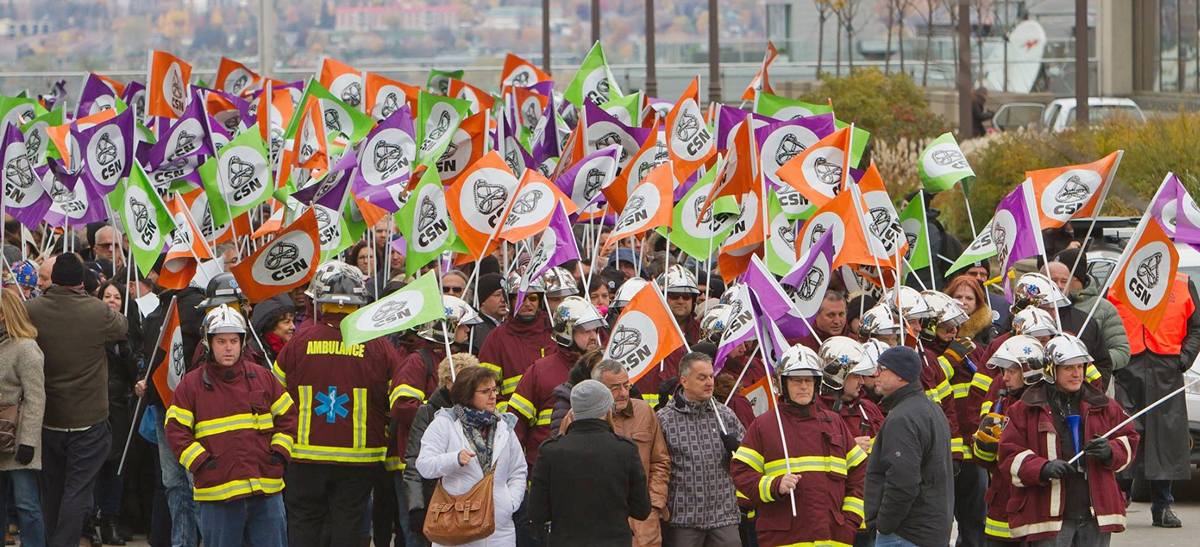

PREVIOUS
ISSUES | HOME
Website: www.cpcml.ca
Email: office@cpcml.ca
|

